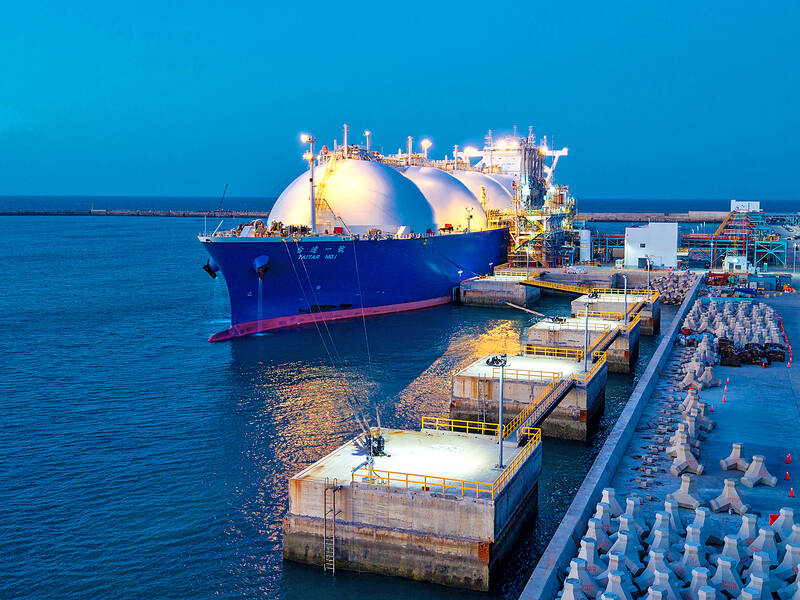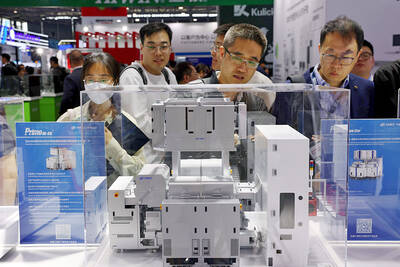Israel’s attacks on Qatar’s capital, Doha, on Tuesday would not affect Taiwan’s liquefied natural gas (LNG) imports, as most ships carrying the fuel that are scheduled to arrive this month were already en route or had already arrived, Minister of Economic Affairs Kung Ming-hsin (龔明鑫) said yesterday.
State-run CPC Corp, Taiwan (台灣中油) has told the ministry it expects 12 cargo ships to deliver LNG from Qatar this month, Kung said.
As the attack targeted Qatar’s capital rather than its oil fields, the impact should be limited, he said, adding that the ministry would continue to monitor the situation.

.Photo courtesy of CPC Corp, Taiwan via CNA
Taiwan has been diversifying its LNG import sources with stable supply a priority, and the government would assess purchasing from sources that are price-competitive, the ministry said in a statement on Tuesday.
Taiwan’s LNG purchases are primarily medium or long-term contracts supplemented by short-term and spot purchases, an approach that is expected to improve power supply resilience and stabilize supplies, the ministry said.
The nation imported LNG from 14 sources last year, including Australia, Brunei, Malaysia, Nigeria, Papua New Guinea, Qatar and the US, it said.
Australia accounted for 38 percent of the imports, followed by Qatar’s 25 percent and the US’ 10 percent, ministry data showed.
CPC in June said that amid rising geopolitical tensions in the Middle East, it adopted a risk diversification strategy by sourcing crude oil and LNG from multiple nations.
The company would continue to follow the strategy and closely monitor developments in the region, while striving to lower its reliance on Qatari sources, a CPC official told the Taipei Times by telephone.
The attacks have not affected LNG supply or prices in the Persian Gulf, said the official, who spoke on the condition of anonymity.
In other news, state-run Taiwan Power Co (Taipower, 台電) might deploy backup units to keep the electricity grid’s reserve margin above 6 percent after a fire affected operations at Hsinta Power Plant (興達電廠), Taiwan’s third-largest power plant, in Kaohsiung on Tuesday night, Kung said.
Electricity consumption this autumn is unlikely to be affected, as peak demand usually occurs in July and August, he said.
The ministry would urge Taipower to address safety concerns and reactivate affected generators as soon as possible, he said.
Restarting the generators should be done before the end of this year, as the situation does not seem too serious, he said.
Kung also commented on media reports that the government is planning an economic corridor with the Philippines to link the two countries’ semiconductor, renewable energy, shipbuilding, drone, smart agriculture, digital infrastructure and submarine cable industries.
As the Philippines is close to Taiwan, there would be many opportunities for cooperation, Kung said, adding that details of any plans would be disclosed when they are confirmed.
See QATAR on page 5

With this year’s Semicon Taiwan trade show set to kick off on Wednesday, market attention has turned to the mass production of advanced packaging technologies and capacity expansion in Taiwan and the US. With traditional scaling reaching physical limits, heterogeneous integration and packaging technologies have emerged as key solutions. Surging demand for artificial intelligence (AI), high-performance computing (HPC) and high-bandwidth memory (HBM) chips has put technologies such as chip-on-wafer-on-substrate (CoWoS), integrated fan-out (InFO), system on integrated chips (SoIC), 3D IC and fan-out panel-level packaging (FOPLP) at the center of semiconductor innovation, making them a major focus at this year’s trade show, according

DEBUT: The trade show is to feature 17 national pavilions, a new high for the event, including from Canada, Costa Rica, Lithuania, Sweden and Vietnam for the first time The Semicon Taiwan trade show, which opens on Wednesday, is expected to see a new high in the number of exhibitors and visitors from around the world, said its organizer, SEMI, which has described the annual event as the “Olympics of the semiconductor industry.” SEMI, which represents companies in the electronics manufacturing and design supply chain, and touts the annual exhibition as the most influential semiconductor trade show in the world, said more than 1,200 enterprises from 56 countries are to showcase their innovations across more than 4,100 booths, and that the event could attract 100,000 visitors. This year’s event features 17

Germany is to establish its first-ever national pavilion at Semicon Taiwan, which starts tomorrow in Taipei, as the country looks to raise its profile and deepen semiconductor ties with Taiwan as global chip demand accelerates. Martin Mayer, a semiconductor investment expert at Germany Trade & Invest (GTAI), Germany’s international economic promotion agency, said before leaving for Taiwan that the nation is a crucial partner in developing Germany’s semiconductor ecosystem. Germany’s debut at the international semiconductor exhibition in Taipei aims to “show presence” and signal its commitment to semiconductors, while building trust with Taiwanese companies, government and industry associations, he said. “The best outcome

Semiconductor equipment billings in Taiwan are expected to double this year, as manufacturers in the industry are keen to expand production to meet strong global demand for artificial intelligence applications, according to SEMI, which represents companies in the electronics manufacturing and design supply chain. Speaking at a news conference before the opening of Semicon Taiwan trade show tomorrow, SEMI director of industry research and statistics Clark Tseng (曾瑞榆) said semiconductor equipment billings in Taiwan are expected to grow by an annual 100 percent this year, beating an earlier estimate of 70 percent growth. He said that Taiwan received a boost from a